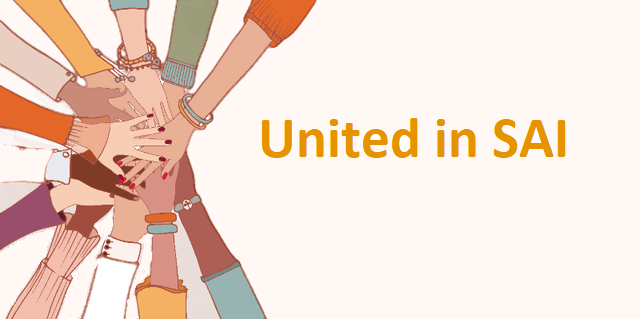
In Commemoration of the 96th Birthday of
Sri Sathya Sai Baba
In commemoration of the 96th year since the advent of Bhagawan Sri Sri Sathya Sai Baba, this section of the website was added to highlight some of the favourite quotes selected by members of our team across the globe that they each felt helps them advance on the path towards Self-Awareness and would likewise help fellow youths. The selection of quotes here are as varied as they are indeed soul-stirring. Most interestingly, each contributor has supported their favourite quote with a write-up that reflects their personal journey thus far and how the relevant quote encapsulates this. We trust the quotes and personal sharing by our brothers and sisters will be a source of inspiration to one and all. The journey continues …
This page is best viewed from a desktop/laptop.
Select a quote from the drop down list >>>
Why fear, when I am here?
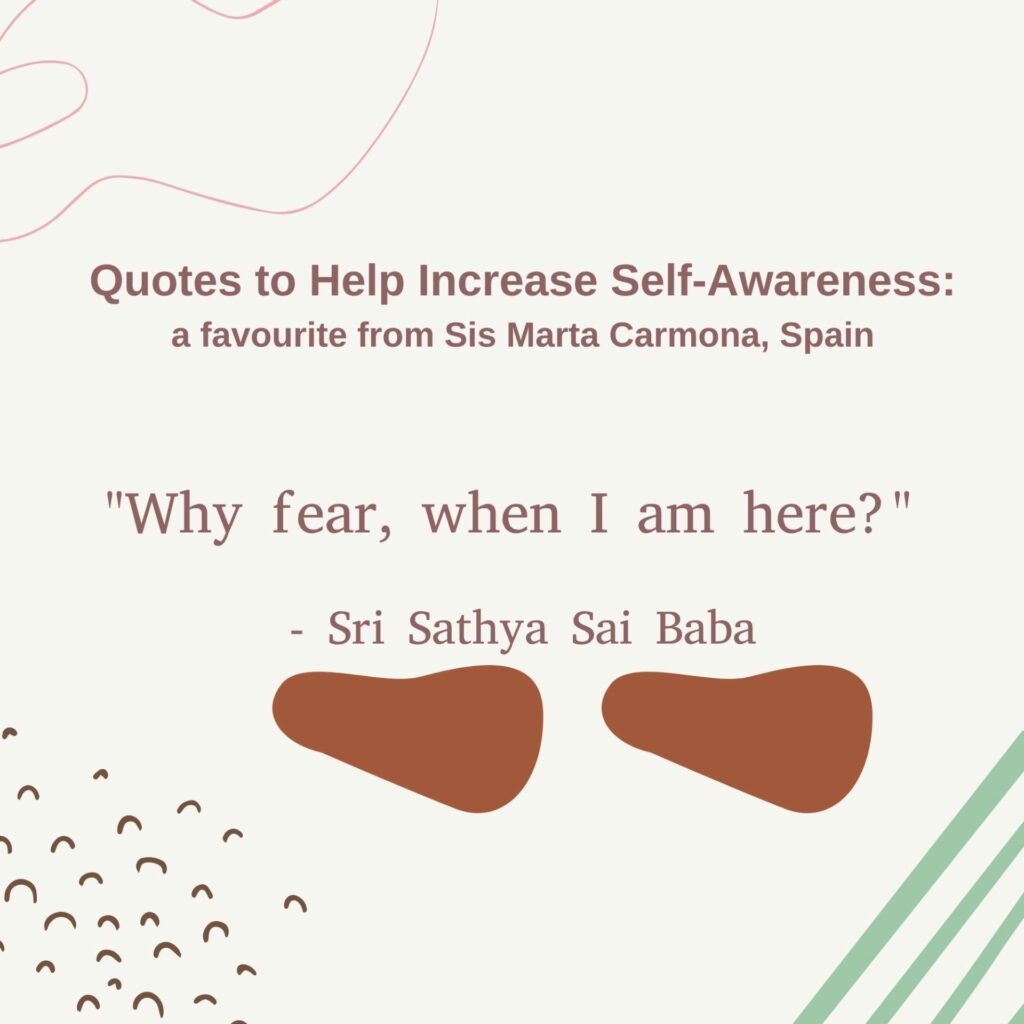
This quote is special to me. I have always felt internal company; it is not something I learned, it is something that has always accompanied me. Over the years I have come across situations that I did not understand, and many times, they began to awaken such an unpleasant feeling of strangeness and alienation that, if I let it grow, it would end up being similar to fear.
Until Baba appeared in my life.
At home there were several pictures of Him and one with this message. Since then, every time that a feeling similar to fear starts to awaken in me, I realize that I am not alone. I realise that All is One and the Same. Then my efforts will be focused on imagining that whatever is in front of me is Baba: disguised and testing me. And if I study it and turn the matter around I will find a way to embrace it. And similarly, when something shows up as “Uh!!!” in my life, it is Baba that is teaching me something.
In this way, if we continually think of Him and see Him in All and Everyone, Baba can be Himself through Ourselves.
The only purpose of human life...
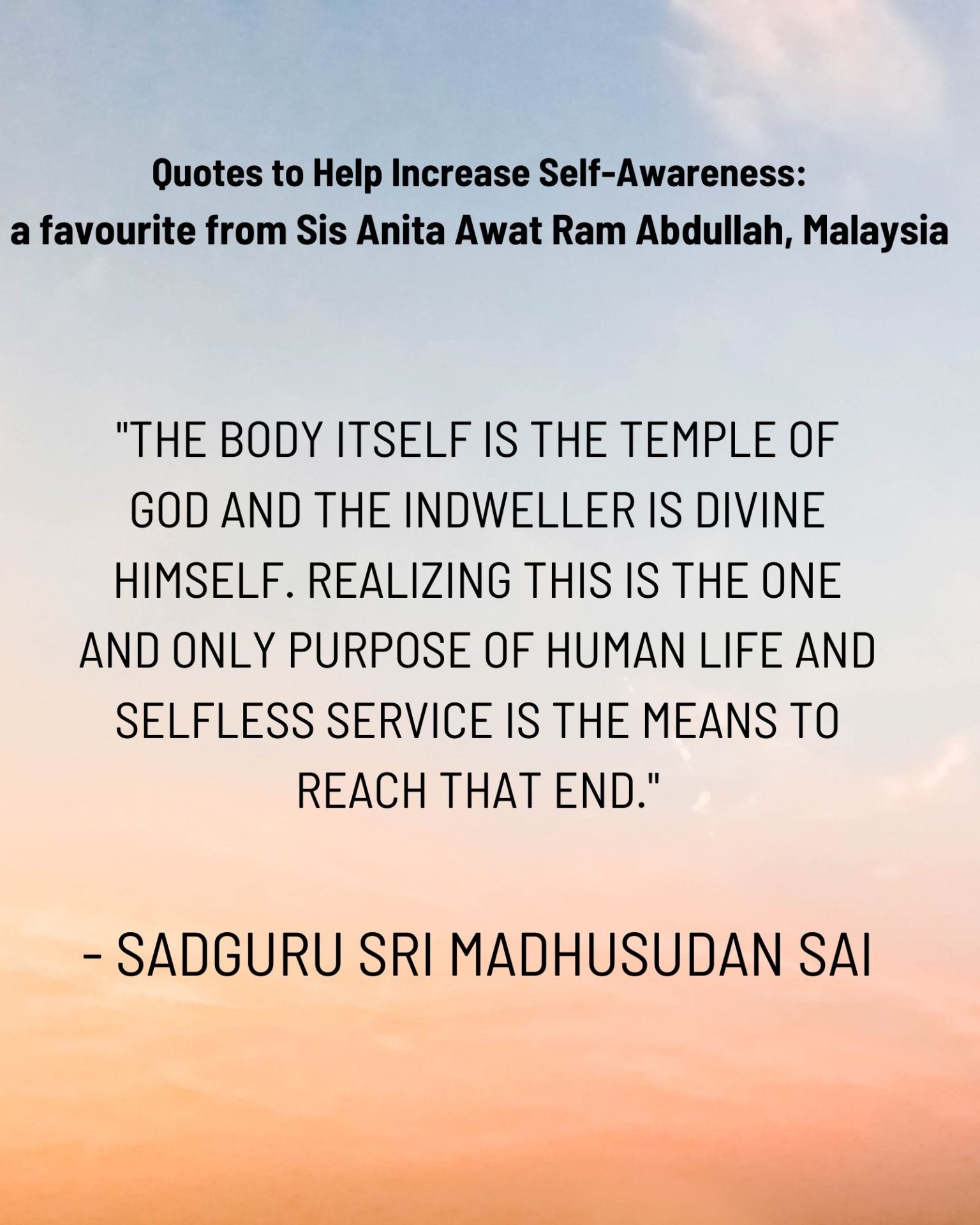
The human being undertakes a double journey on his earthly sojourn: an external journey and an inner journey. In both journeys the aim is to find lasting happiness. For most people, the external journey dominates their lives: their beliefs, attitudes and perspectives are predominantly focused on their own well-being and driven solely by their own needs. Satisfaction of the mind driven by senses dominates their lives; selfishness fuels their energies; and these energies are misdirected in a sensorial way and propelled solely towards their pursuit of happiness.
When one ‘decides’ to walk the spiritual path to explore the inner journey, his ultimate finding eventually will lead him to the realisation that there is an in-dweller within, which is Divine. This Divinity is recognised as an Eternal Awareness far more powerful, all-encompassing and all-permeating than what was previously felt and believed in his sensorial, material life.
When on the spiritual path, how does one get in touch with this Divine in-dweller within oneself? For most, it is by tremendous effort, through a slow, arduous process which one has to endure in his journey. Whatever one does in his external journey, the effort put in and the time spent must be directed towards selfless service. One must constantly remind oneself that all the work and actions that one does must be for the welfare of others who are and will be affected by the said work or action undertaken. With this kind of selfless service and unwavering persistence, one will be able to transcend and progress beyond the mind and senses towards a transcendental vision which is the goal of the inner journey.
Constant enquiry of the motive driving one’s efforts is necessary in this inner journey. Any selfish motive nullifies the effort put towards the work or action undertaken, taking one further from the goal of self-realisation, not towards experiencing the Divine within. When all actions are selfless, one will get to experience this Divinity – the unconditional love wherein one ‘sees’ all as being One with him and he, One with all. This vision will only emerge once one transcends the sensorial vision driven by selfishness and egoism. Only then can one touch the Divine spirit within, to be One with All, and thus achieve the actual purpose of human life.
I am always and forever unaffected...
“Who am I?” is the great question each of us must ask ourselves at some point in our lives. We get caught up in our roles and responsibilities, and we begin to identify strongly with our bodies and minds throughout our adulthood. Individuals like myself who are overly-sensitive or easily-affected by others’ words and actions struggle to overcome this false identification. Thankfully, inspired souls such as Nitya Shanti are making great efforts to lift us out of our self-imposed restrictions.
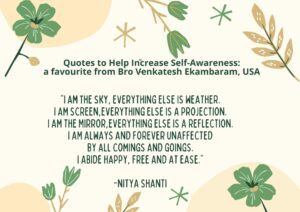 The quote above was an affirmation Nityaji created for us. It reminds me that I am the infinite, expansive awareness in which events occur. Bhagawan Baba taught us that pleasure and pain are like passing clouds. Bhagawan Ramana taught us that we are the screen, ever unaffected by the characters and images that are projected onto it. Sri Adi Sankara describes Brahman as the mirror upon which the lights of a city appear as glittering jewels in his Dakshinamurthy Stotram.
The quote above was an affirmation Nityaji created for us. It reminds me that I am the infinite, expansive awareness in which events occur. Bhagawan Baba taught us that pleasure and pain are like passing clouds. Bhagawan Ramana taught us that we are the screen, ever unaffected by the characters and images that are projected onto it. Sri Adi Sankara describes Brahman as the mirror upon which the lights of a city appear as glittering jewels in his Dakshinamurthy Stotram.
The last line of Nityaji’s affirmation has been especially helpful because it is the practical application of the four lines above it. When I am in the process of witnessing, I am united with my true nature, which is blissful and equanimous. Meditation is the act of calmly abiding as one’s real Self. I can grow in detachment from my likes and dislikes and begin to realize that nothing can affect me. Our inner truth is always available and, through regular practice, we can access this inner dimension.
I forget these powerful teachings, due to habit and the tendency of the mind to flow outward. Satsang and a general dissatisfaction with what the world has to offer continually bring me back to the wisdom of the ancients. Through these experiences, my understanding of this existence has progressed. Now I know that Bhagawan Baba has made life beautiful with all of its ups and downs.
I no longer view it with negativity but as a series of necessary lessons that this mind requires. The projection and the reflection owes its very being to the Consciousness that gives it life. I am the Life in its totality, and this body-mind is but a character within it. The real doer is Brahman, the sky and screen which I truly am. We always were free and boundless.
As you start to walk on the way...
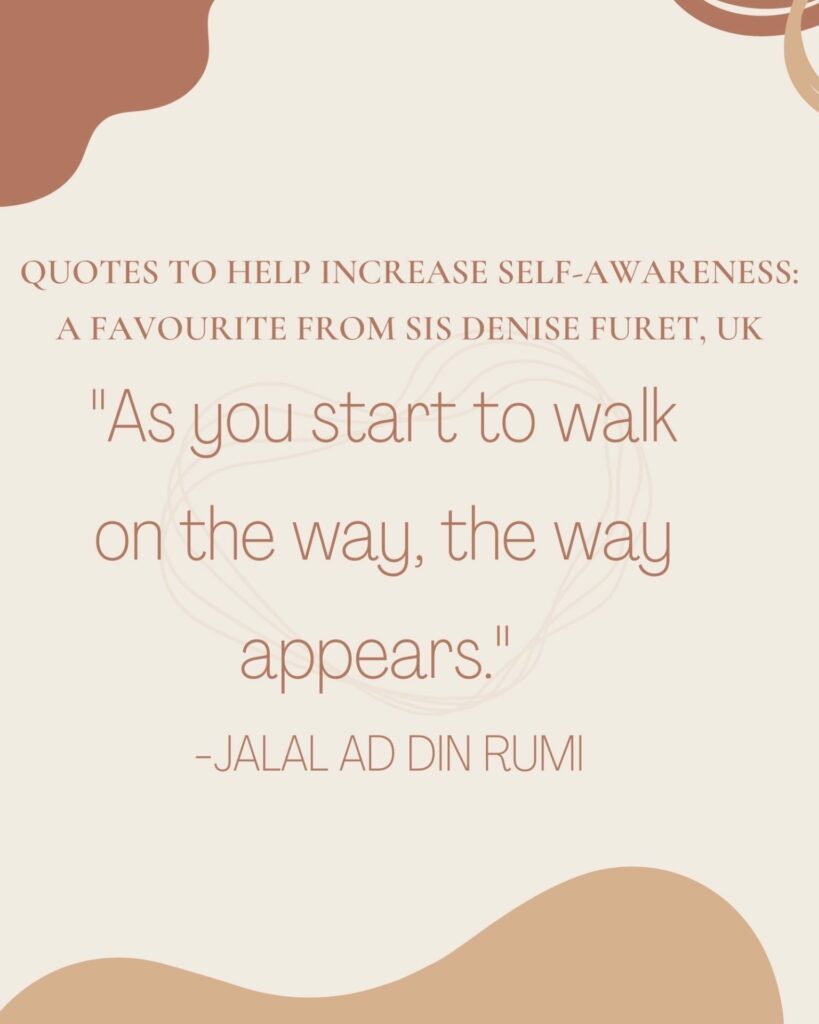
This is a wonderful quote from Rumi, the wise Persian poet.
This has been my experience with spirituality and most areas of my life. With Sai Baba I started to read books and then dreams appeared, followed by a life-long journey of hide and seek with the Master.
Just as I needed to grow more in spirituality, I stepped into Kriya yoga which took me another step forward. Then as that was starting to sink in, I walked straight into ‘Master the Mind’ and finally the possibility of Self Realisation.
In 2008 I gave Sai Baba a letter asking to merge with Him. Six months later I merged for seconds, maybe minutes. So strong was this experience that it knocked me out for hours. Longing for this experience to become a reality, I watched as Madhusudan Sai became liberated right in front of my eyes during Guru Poornima in 2019. Since then he has been providing us with the tools to also reach that goal.
So by starting to walk on the way, the path will definitely appear. This has also been the case for so many other areas of my life.
Why fear, when I am here?
This quote helps me when times get tough. More importantly however, it is a call to recognise the truth about myself. From a more general perspective, fear is one of the strongest drivers for doing the wrong thing: greed for profit, striving for power, hurting others; as such, it is also one of the greatest obstacles to realising the self/being aware of the self.
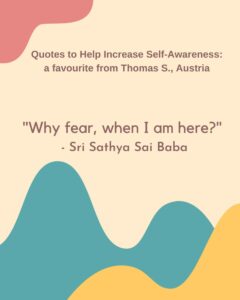 How does fear interrelate with self-awareness? Besides anger and greed, as fear is such a primal driver, it is very strong, very subtle and it prevents us from becoming aware of the Divine within. Imagine if we were not afraid of anything, how would we be able to act and, as a result, how would the world look like?
How does fear interrelate with self-awareness? Besides anger and greed, as fear is such a primal driver, it is very strong, very subtle and it prevents us from becoming aware of the Divine within. Imagine if we were not afraid of anything, how would we be able to act and, as a result, how would the world look like?
‘Why fear when I am here’ is ultimately significant to me in two aspects. The literal meaning suggests to me: why be afraid when the Divine is everywhere? As long as we have done all that is humanly possible, why worry? Why not leave it in the Divine hands? This alone is very powerful, as it allows us to let go of things, become peaceful and ultimately get closer to the Divine.
Even more significant is the subtler meaning of this sentence. As Dr. Sekhar Boddupalli has pointed out in his Rudram class, there is a second way of looking at this sentence: ‘Why fear? When I am; here’. This means that as long as I am totally in the present, there is no fear. While this might initially appear to be paradoxical, in fact, if we think about this deeply, it can be said that all we experience in our daily lives is not the present, but the past. It is a principle of fundamental Physics that all the sounds we hear and pictures we see have emanated before the point we can actually perceive them, which means that our perception is behind the present; this in turn means that our perception and the fear associated with it are all not within the present, but refer to the past or some kind of future event. This thought helps me to be calm and be in a space of complete silence in times of challenges.
So the next time you sit on that plane, go into that meeting or walk on that dark road, ask yourself: ‘Why fear, when I am; here’.
You cannot believe in God until...
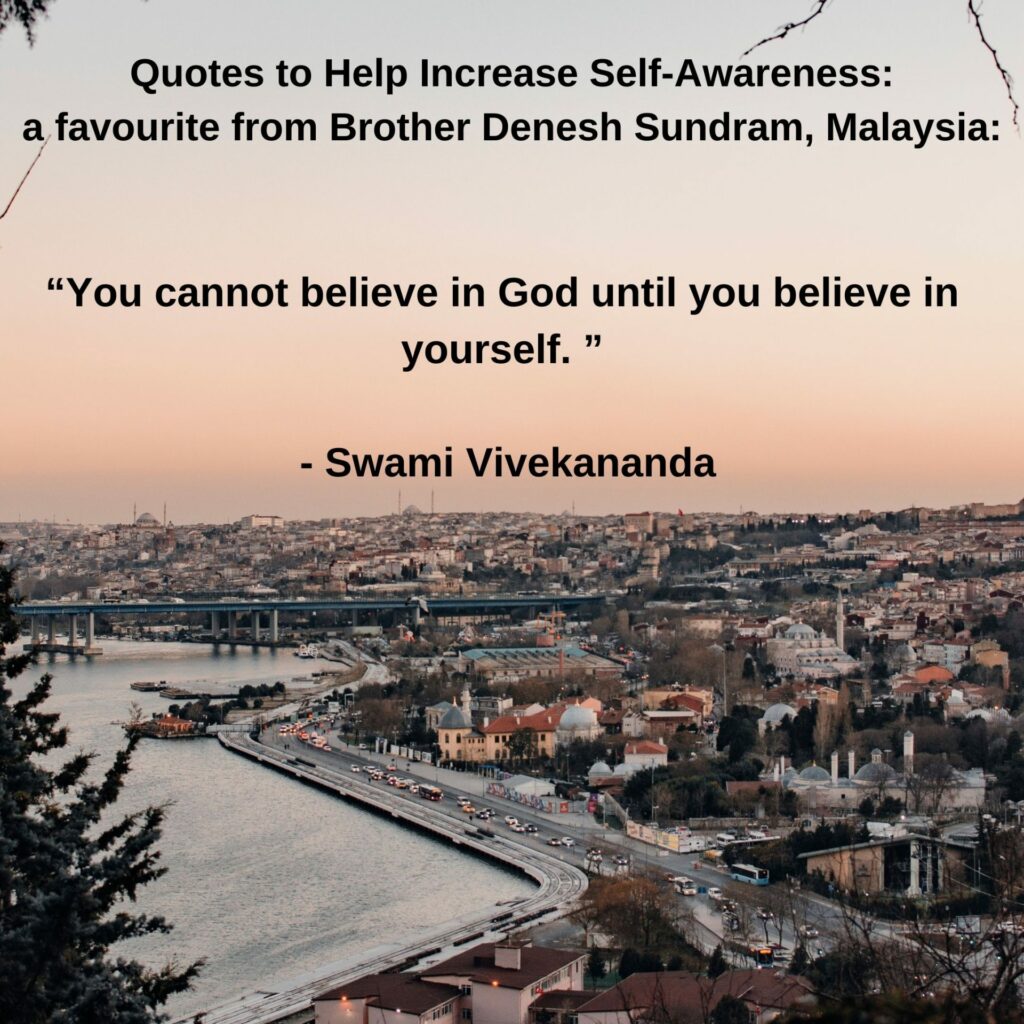
Swami Vivekananda’s teachings have truly been a guiding light in my life. He has inspired me in many aspects of my life and this particular saying of his: “You cannot believe in God until you believe in yourself” is a favourite of mine.
This quotation is special to me because I’ve always been taught to surrender everything to God, to do my best, and He will take care of the rest. Once I’ve done my best and I’ve surrendered completely to God, what’s the purpose of being worried about the outcome? I am not different from God; He is the source from within and once I do the right thing, if I do not believe in myself, that is equivalent to not believing in God.
The very first step towards self-realisation is to have complete faith in God and all the spiritual masters’ teachings of always being good and doing good. I have come to realise that everything that happens in my life is in fact decided by God for a greater good on my path to self-realisation; I’m merely an instrument acting through His will.
During my times of doubt and uncertainty, Swami Vivekananda’s words have always made me self-evaluate my actions and thoughts: would God be pleased with the decision that I’ve taken? This has helped me to take the right decisions in life and have kept me on the path of complete surrender and self-belief.
The greatest happiness: to be useful to others...
I selected this inspiring message from Saint Mother Teresa of Calcutta because it conveys to us the importance of several things: of living in our present, day by day; being grateful for our family, for what we have on a daily basis; and the importance of helping and serving others. With respect to education, we must not forget that our main teachers are our children and students. It is actually this exchange of knowledge which allows us to advance day by day and extract the most positive values from our inner being.
Service – a path to self-transformation:
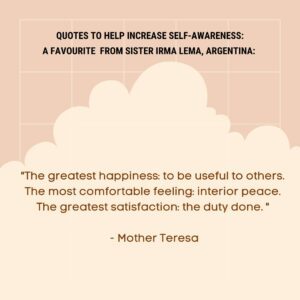 My name is Irma Lema and since I was a child, through the hand of Sai, I have been travelling along this wonderful path of service. Through both positive and negative experiences, Swami has shown me that seva is not only charity; it is the greatest form of spiritual practice. We receive the grace of God when it is done without reward or expectation. What matters is our inner feeling and communication from heart to heart.
My name is Irma Lema and since I was a child, through the hand of Sai, I have been travelling along this wonderful path of service. Through both positive and negative experiences, Swami has shown me that seva is not only charity; it is the greatest form of spiritual practice. We receive the grace of God when it is done without reward or expectation. What matters is our inner feeling and communication from heart to heart.
It fills me with gratitude to realize it as an offering to God. I believe that we came to this world to serve our brothers and sisters – children, youth and adults; to listen to them, cover their basic needs and be able to give them words of Love and Faith.
Personally, seva also helps me develop patience and dedication. SED of God: Service-Education and Devotion. Both values go hand in hand and are One.
The service rendered in groups and/or teams is also part of spiritual practice. Each human being is different and unique. Sharing group and individual experiences can also help us improve the quality of the service.
LOVE ALL AND SERVE ALL.
Don't be a football of other people's opinions
Let anyone think whatever they want. Why are you getting disturbed? Don’t give too much importance to what others think or what others say. Thoughts and opinions vanish in no time.
Their likes and dislikes are like bubbles on the surface of water. Why give so much importance to their thoughts? Thoughts are like ripples in water. One minute the thought is there, the next minute it´s not there. Everything is in a constant state of change. In this changing world, thoughts are the most ever-changing thing. It’s like trying to hold on to a wave, that is anyway disappearing.
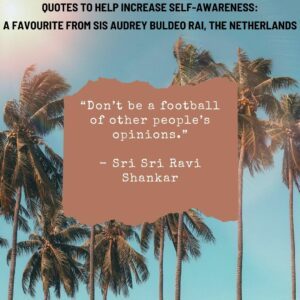
Anybody can have any opinion. Let them have theirs. You move on. It appears to be tough but once you take a step you will see it’s not so tough. Opinions of people come and go. They may think bad about you, or think good about you. Then they become quiet. If you are clear in your heart that what you do is right, and what you want to do is right, you just do it!
A man and his son were going with their donkey to the market. As they were walking along by its side a countryman passed them and said: “You fools, what is a donkey for but to ride upon?”
So the man put the boy on the donkey. As they passed a group, one said: “See that lazy youngster, he lets his father walk while he rides.”
The man ordered his boy to get off, and got on himself. They passed two women, and one said: “Shame on that lazy lout to let his poor son trudge along.”
The man didn’t know what to do, he decided they both should ride the donkey. When they arrived in the town, the passers-by began to jeer and point at them. The man stopped and asked what was wrong. The men said: “Aren’t you ashamed for overloading that poor donkey of yours?”
They both got off and tried to think what to do. They tied the donkey´s feet to a pole and carried him on their shoulders. At the market bridge, the donkey, getting one foot loose, kicked out and the pole dropped. The donkey then fell over the bridge and drowned.
“That will teach you,” said an old man who had followed them: “Please all, and you will please none.
Not all of us can do great things...
Of the millions of species in this world, taking human birth is a rare opportunity. And when this human birth is blessed with the love and guidance of a Guru, it is quite natural to aspire to do great things, to desire to change the world, to want to make a difference and touch the lives of many.
 However, being grahastas or householders wearing multiple hats of father, mother, husband, wife, son, daughter, brother, sister, etcetera, balancing our roles with a career to provide for the family often impedes our journey to do these things. The limited resources, especially of time, often is a challenge to many of us. And I am no exception to this situation. Many a time, I have wondered if the numerous items in my bucket list will ever be fulfilled.
However, being grahastas or householders wearing multiple hats of father, mother, husband, wife, son, daughter, brother, sister, etcetera, balancing our roles with a career to provide for the family often impedes our journey to do these things. The limited resources, especially of time, often is a challenge to many of us. And I am no exception to this situation. Many a time, I have wondered if the numerous items in my bucket list will ever be fulfilled.
I chanced upon Mother Theresa’s quote: “Not all of us can do great things. But we can do small things with great love.” It was a real eye-opener for me. It changed my whole perspective. I moved my focus from the unfulfilled items in my bucket list to doing everything lovingly. For example, normally when I do food seva, my focus would be on the quality and quantity of food and logistics of the activity. But now, in addition to the above, I make a conscious effort to shower love. I pray to Swami to fill my heart with love and radiate that love with a big broad smile and make it a point to exchange a few words with the recipients. I realised that it is this love that the recipients really needed. The love that I expressed was reciprocated exponentially. It made them happy and it certainly made me a much happier person.
We often think that only tender loving care is appreciated. I was surprised to learn that even my ‘tough’ love was appreciated by the recipient herself. An example is a student whom I reprimanded regularly for her constant incomplete homework. I decided to stop as I felt that it did not have any impact. Soon she realized that I had stopped. With eyes filled with tears she expressed that she knew that every time I reprimanded her it was only out of love and concern for her and asked me not to give up on her. She not only became more diligent but also starting sharing her thoughts and feelings with me.
Smiling, exchanging a few words of kindness and radiating the love in our hearts are not great things and do not require much resources. These are simple things that anyone can do if we make a conscious effort. But the impact is truly beautiful and heart-warming. Try it. After all, we are embodiments of love!
Beauty is required in heart, not in face
Beauty is neither in the face nor in the eyes of the beholder but in the heart which loves all and serves all, regardless of nationality, religion, gender, caste and many other divisions which seem to have separated mankind over the years. This particular quotation touches my heart as it is very similar to Swami’s words, which I am very sure most of us know well: LOVE ALL, SERVE ALL.
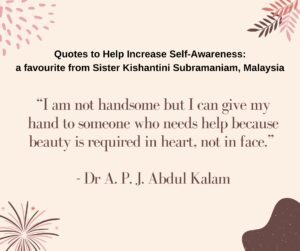 In my service as a medical practitioner, I face many different types of people everyday – the rude, adamant, stubborn ones, as well as the sweet, kind and caring ones. I must be able to treat them all equally without the slightest bias and I think I am able to do so almost all the time because of this very quotation which constantly runs through my mind and is embedded in my heart.
In my service as a medical practitioner, I face many different types of people everyday – the rude, adamant, stubborn ones, as well as the sweet, kind and caring ones. I must be able to treat them all equally without the slightest bias and I think I am able to do so almost all the time because of this very quotation which constantly runs through my mind and is embedded in my heart.
I believe that one gets to know himself better when he goes all the way to ease someone else’s burden. By helping another person, you are actually helping yourself to discover the kind of person you are.
Now why do we need to know who we are? Aren’t we all ‘Brahman’? Yes we are, but most of us are still swimming around in the world of maya and we are still living a maya-filled life, because we have not attained self-awareness, which is the first stepping stone towards Brahman. Therefore, to merge with Brahman, we need to have self-awareness, and I believe the first step towards self-awareness is to lose yourself in the service of others.
Best self-interest lies in achieving universal well-being
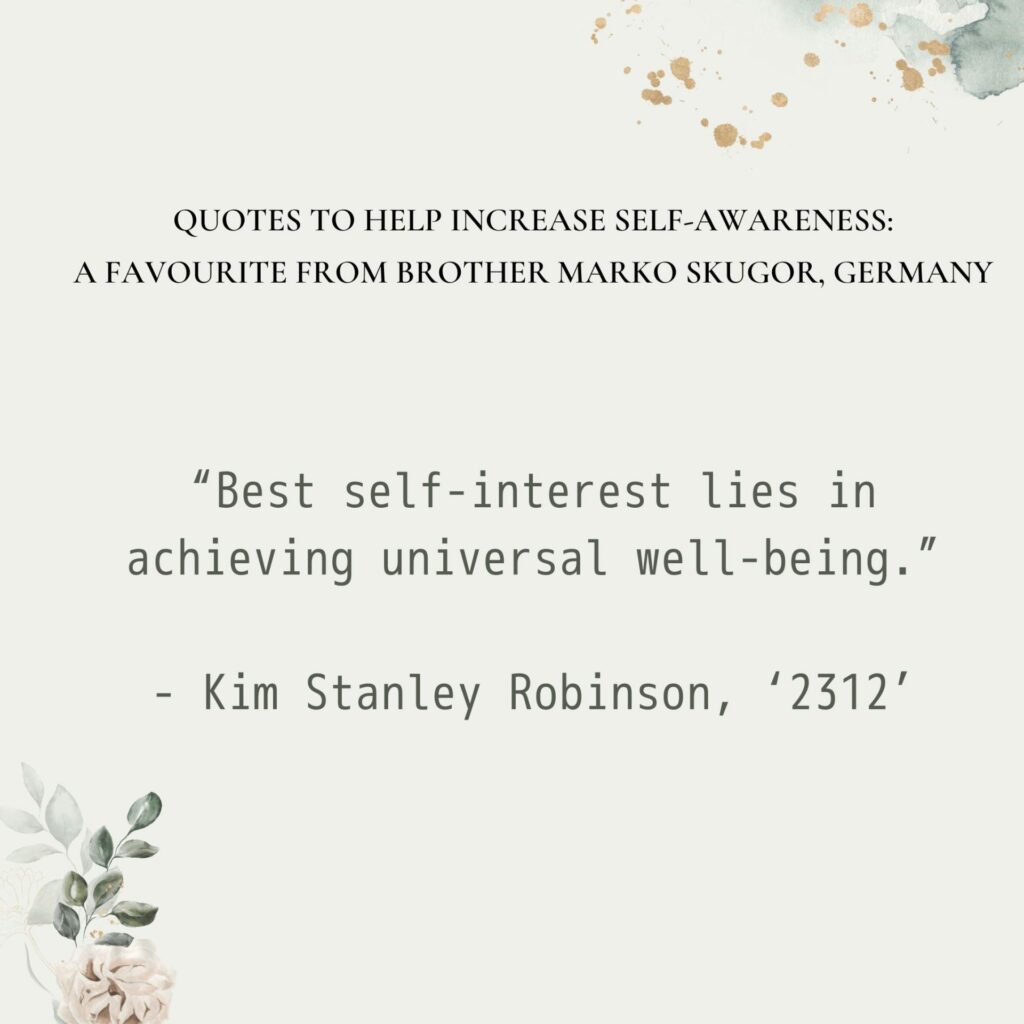
Stanley Robinson is one of the most acknowledged and accomplished science fiction authors of our time. He made use of the genre to explore ideas relating to nature, sustainability, social justice, and culture. In his book 2312, Robinson writes mostly about the habitability of the planets of the solar system, as well as how to help planet Earth in the process. At one point, however, he raises this idea that everyone, even ‘bad’ people, should come to the conclusion that universal well-being is a necessary avenue for realizing one’s own interests, even if those interests are completely selfish. This way of thinking is unusual because one either thinks in selfish or selfless terms, one or the other. Here they are cleverly synthesized into a simple, yet profound new concept. Even on a strictly material level, it channels the principle of unity of all. Man is not an island, and the suffering of others inevitably leads to one’s own suffering. On the other hand, prosperity and happiness among all surely benefit the individual in his own pursuit of his goals and dreams, by creating the circumstances that make many other opportunities possible.
In the book, Robinson even goes a step further, claiming that only ‘foolish’ people will not be able to realize this, that even someone ‘bad, but smart’ will still work towards the common good. This puts quality education at the focus as the critical requirement for universal well-being, unfailingly leading to it. Furthermore, selfish motivations can become purified and transformed by working towards the common good. Swami has taught us this exact principle.
Finally, the quote can also be interpreted slightly differently: Through our efforts in achieving universal well-being, we can progress on the path to our best self-interest. In other words, through selfless work and service to others we will advance towards self-realization as the ultimate self-interest.
You will face many defeats in life...
In the course of our life, we will face many experiences. These experiences can deliver either positive or negative outcomes.
Negative outcomes can be generally defined as outcomes which do not match up to our expectations. When things do not go our way, we feel defeated; our spirits are crushed. This can make a dent in our aspirations in life. 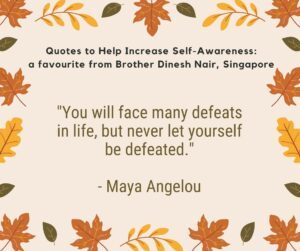 Defeats can be painful. No one likes to talk about our defeats. But in every defeat, there are experiences that we can learn from that make us grow stronger. Just like the up and downs of the stock-market, so too goes our journey of life.
Defeats can be painful. No one likes to talk about our defeats. But in every defeat, there are experiences that we can learn from that make us grow stronger. Just like the up and downs of the stock-market, so too goes our journey of life.
It is also during times of defeat that such ‘negative’ experiences can become man’s best teacher. They teach us valuable lessons that no textbook can offer. In times of defeat, we should never let ourselves be defeated; but rather, introspect and find the courage to acknowledge our weakness as well as find ways to keep progressing so that we eventually metamorphosize into beautiful butterflies. In times of defeat, our loved ones will encourage and comfort us; sometimes they will push us even harder to press on to victory. Sometimes it can be a painful journey; we might feel that we are on this journey alone. But God (Swami) is our best friend and is always guiding us for our highest good. Just like diamonds are created through high temperatures, so too with our experiences; these tests can only make us stronger.
The above quote resonates with me deeply. Despite the numerous setbacks I have faced, I have met many amazing people who have comforted me, guided me and encouraged me to never give up and to persevere and do my best.
The unexamined life is not worth living
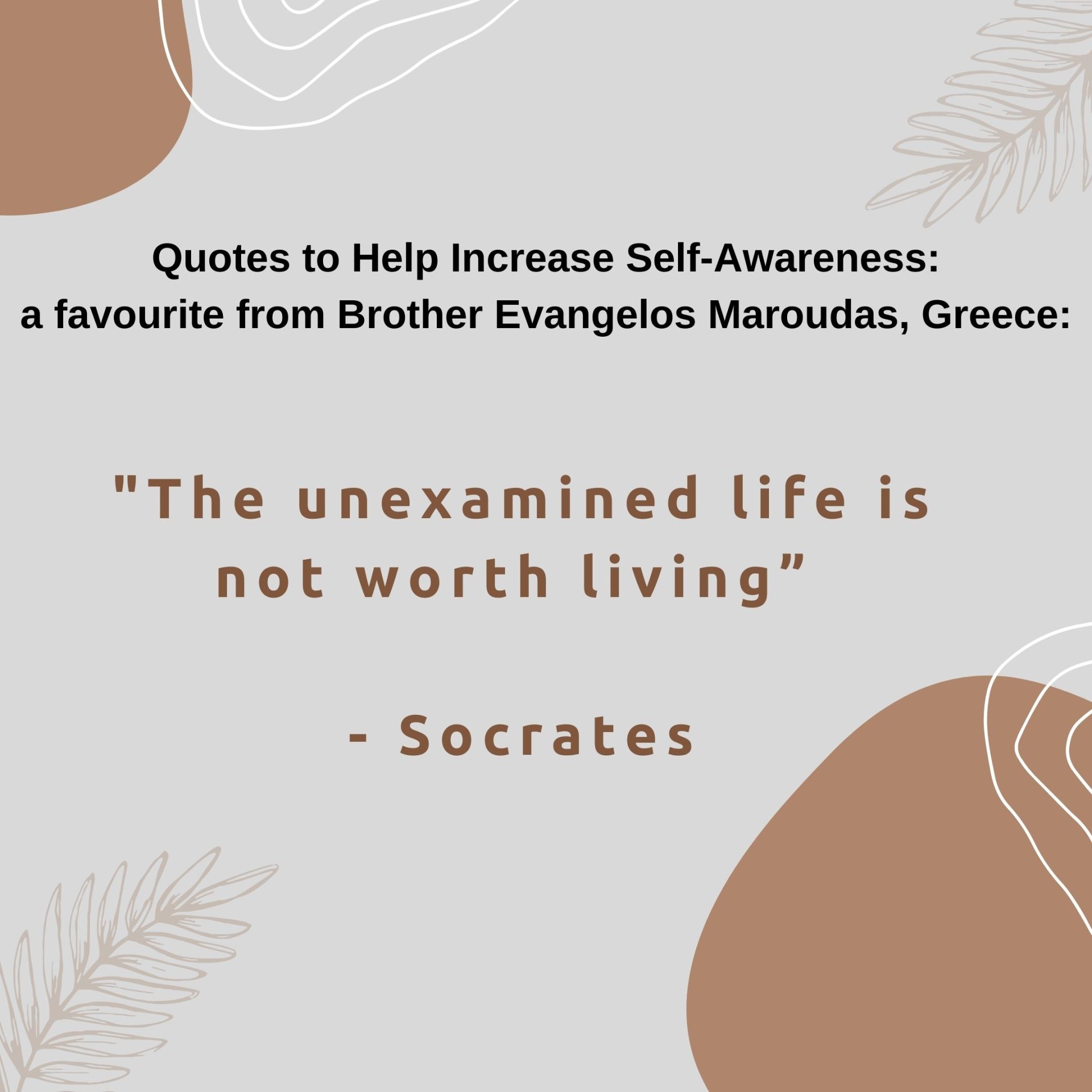
This quote from Socrates reflects his dedication to the continuous search for the Truth, and especially into the self-inquiry of: ‘Who am I?’ This resonates well with my deeply inquiring nature, which, ever since I was a child, made me ask and wonder about everything that I perceived around me, as well as within my body and myself. It was always a mystery to me, how people could simply live their life and go to work, without questioning why they do what they do, and what the purpose of their life is.
Socrates was known for using questioning as a method of discovering the truth, which he knew was latent inside all of us. In his discourses, he would never try to teach others some fixed philosophical doctrine; instead, he would keep posing the right questions, which would lead his interlocutors into discovering the truth already inherent within them. That is why, his method was named ‘maieutic’, which means ‘assisting one to give birth’, like midwifery or obstetrics.
Socrates was doubtlessly the most influential of the many philosophers, rishis and sages who lived in Greece during the peak of the Hellenic civilization, around the 5th century B.C. The spirit of those men of wisdom is well depicted by the phrase inscribed on the temple of Apollo, in Delphi: ‘KNOW THYSELF’. These words are attributed to many of the philosophers of that time, including Socrates himself, and it is impossible to try and figure out who was the first one who said them.
It appears that in ancient Greece it was widely recognized that, of all kinds of knowledge, self-knowledge is the most important one. In fact, the great philosopher Heraclitus used to say that by inquiring into himself and by knowing himself, he had managed to know everything. This seems to be perfectly in line with the experience of the great Indian Jnanis and sages, such as Ramana Maharshi, and proves that the Truth does not belong to any country or race; it is One and the same for all those who search for it within the stillness of their hearts.
If care is contagious...
At age 15, I attended a leadership conference held by my school, where one of the youths shared the quote “If Care is Contagious it has to Start with Me”. This quote left an imprint on my heart and became my motto in life. I saw this quote as an opportunity to help others whenever and wherever possible as I learned that you should not wait to do a good act, but just dive in. I realized that one simple act done with love and care can spread and it can motivate others to do the same. I started participating in the Student Council to make care contagious by creating inclusionary opportunities for other youths who struggled to fit in and increase the school spirit.
 This ventured into initiating and participating in community service projects. I volunteered in the hospitals, soup kitchens visiting senior citizens, initiating a winter clothes drive at the school, and participating in as these activities created an opportunity to just be loving and share this love to make care contagious and to spread love and joy. In the community, I became active in the youth group held by the Hindu temple and created opportunities for other youth to participate in community service initiatives. Through our Kathak dance classes, we started performing for various charities like United Way to generate support. I learned about Swami at the age of 17, and all the values and teachings resonated within my heart. I started helping with Balvikas and the Sai Center local youth group where we participated in more service-oriented initiatives. Throughout my undergraduate university years, I became part of the leadership committee of Indo-Canadian Student Association and once again as students we continued to create a safe space for all students of all backgrounds. Through this leadership platform we supported relief efforts and created opportunities for service initiatives for youth to participate in the community.
This ventured into initiating and participating in community service projects. I volunteered in the hospitals, soup kitchens visiting senior citizens, initiating a winter clothes drive at the school, and participating in as these activities created an opportunity to just be loving and share this love to make care contagious and to spread love and joy. In the community, I became active in the youth group held by the Hindu temple and created opportunities for other youth to participate in community service initiatives. Through our Kathak dance classes, we started performing for various charities like United Way to generate support. I learned about Swami at the age of 17, and all the values and teachings resonated within my heart. I started helping with Balvikas and the Sai Center local youth group where we participated in more service-oriented initiatives. Throughout my undergraduate university years, I became part of the leadership committee of Indo-Canadian Student Association and once again as students we continued to create a safe space for all students of all backgrounds. Through this leadership platform we supported relief efforts and created opportunities for service initiatives for youth to participate in the community.
Making care contagious became my driving force, I decided that I only wanted to pursue a career that would only be of service, which is what I exactly did and still do in my career.
My journey started off being a very timid girl who was constantly judged and bullied and this slowly blossomed into a small desire to serve and to make care contagious through selfless love and service. Today there is an inner call for me to merge with the light; to be love and share the love as that is my true nature.
Love all serve all
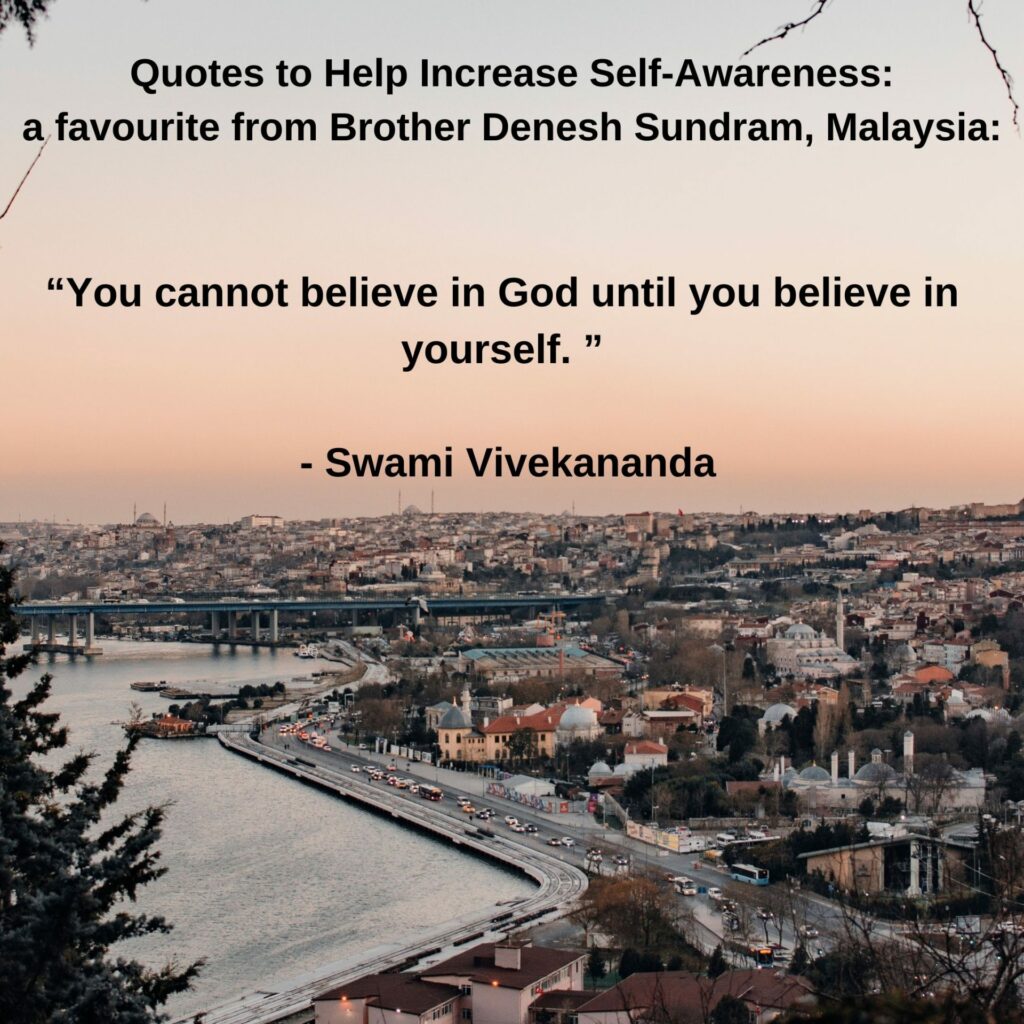
I was first introduced to my Swami with this quotation and since then, this has become the mantra of my life. This particular message of Swami’s became my everyday reminder of how important it is to love another being selflessly without any expectation.
Swami beautifully explained that “Serve All” means to serve any being that needs help in any form, in whatever they need. Swami explained further: “Do not think you are doing them a favour by serving them; instead, be grateful they are the ones giving you the opportunity to serve them”. This is because, when we do selfless service, it is not only the receiver who benefits, but the act of service helps us even more by bringing about self- transformation.
Along the way, I realised how engaging in selfless service and spreading positivity helped me to eliminate my ego of doership and gave me inner peace.
I would like to take this opportunity to thank Swami for creating many platforms for the youth all over the world to engage in selfless service. Thank You, Swami for giving us so many opportunities not only to help others but also to shape us, mould us and transform us. Om Sai Ram.
An eye for an eye leaves the whole world blind
“An eye for an eye” generally means people should be punished according to their crime but in this day and age, this saying will only start an endless cycle of revenge and violence. What I understand and appreciate from my chosen quotation is that even though it may be hard sometimes, the best thing to do when someone hurts us is to forgive that person. Because if everyone chose to resolve their issues with violence, we would all drive humanity to its doom.
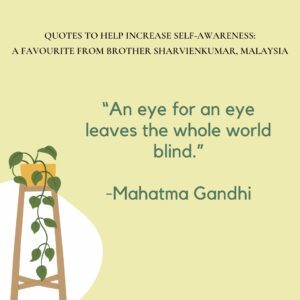
In order to forgive someone who may have done something unpleasant, we have to always implement Swami’s “love all, serve all” teaching. A mother who loves her child would not kick her baby back even though the baby has been kicking her for few months inside her womb. Similarly, when we always look at everyone with love inside our hearts, we will be able to understand why someone did such things to us, which will hopefully give us the strength to forgive that person. Understanding that everyone is divine and when someone behaves in a hurtful manner, that is due only to their ignorance and nothing else, evokes in us unreserved forgiveness for their failing. This will reduce the extent of violence that is happening around us today and make this world a better place to live in.
If you take one step towards me...
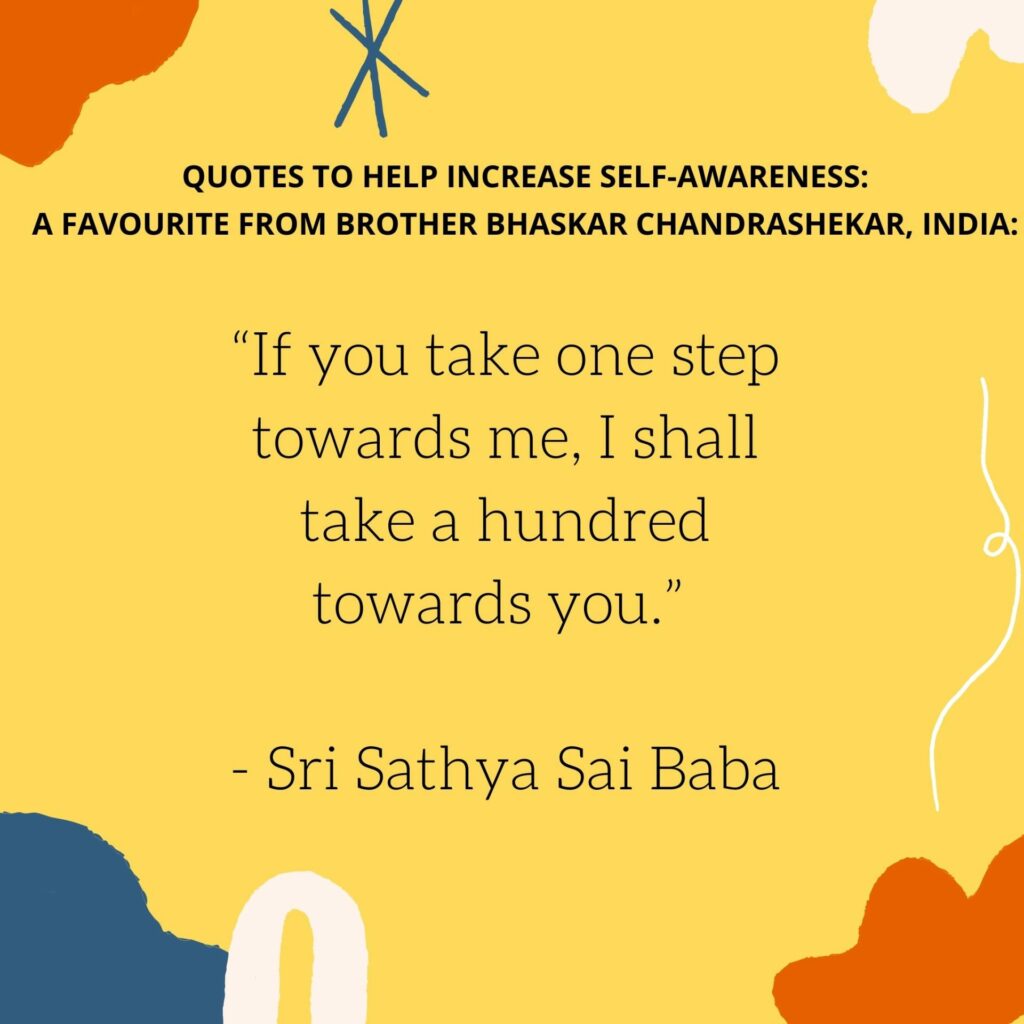
Among my childhood memories, I remember being forced by my parents to have Bhagawan’s darshan in 1995. Even before that, I had been taken for Aksharabhyasam which I hardly remember as I was too young. I vividly remember the occasion in 1995 when I was forced out of my bed at around 4 a.m. I was then a 9 year old kid. I reluctantly went over to Brindavan (Swami’s Ashram in Bangalore), where my parents prayed for my Upanayanam and also prompted me to do so. By His Grace we were called upon too but not before some testing times when the selected one was a Bhaskar from Mysore (a nearby city).
We were waiting that day, standing outside Ramesh Hall until we were told that the count was over as it was limited to 50. But out of the blue, we were told by Padmanabhan Sir at the last moment that we were included, just before Swami’s arrival, by none other than Swami himself. All thanks to Swami, it was a wonderful Upanayanam and tremendous blessings followed continuously after that on plenty of occasions. But that was the starting point of the journey towards God, which was embarked upon with consciousness and no looking back. No force was required to drive me to him as the internal force emerged to start unfolding itself towards Him.
There were plenty of occasions in Brindavan itself, where I had the most satisfying and pleasing seva opportunity of taking care of Bhagawan’s Trayee Brindavan. There were multiple instances where I had to take a small step of sacrificing his darshan in order to bring breakfast to Trayee sevadals. I took the plunge by praying to Swami fervently to ensure that I would not miss His darshan. The Divine Mother, who can never let her children down, accepted the prayers of this small devotee and postponed the darshan, then later gave me a gorgeous smile of acknowledgement and blessings. I was deeply grateful and thrilled.
My most humble pranams at the Divine sweet lotus feet of Bhagawan Sri Sathya Sai Baba. Sairam
Given the opportunity for 'Earth-School' enrolment...
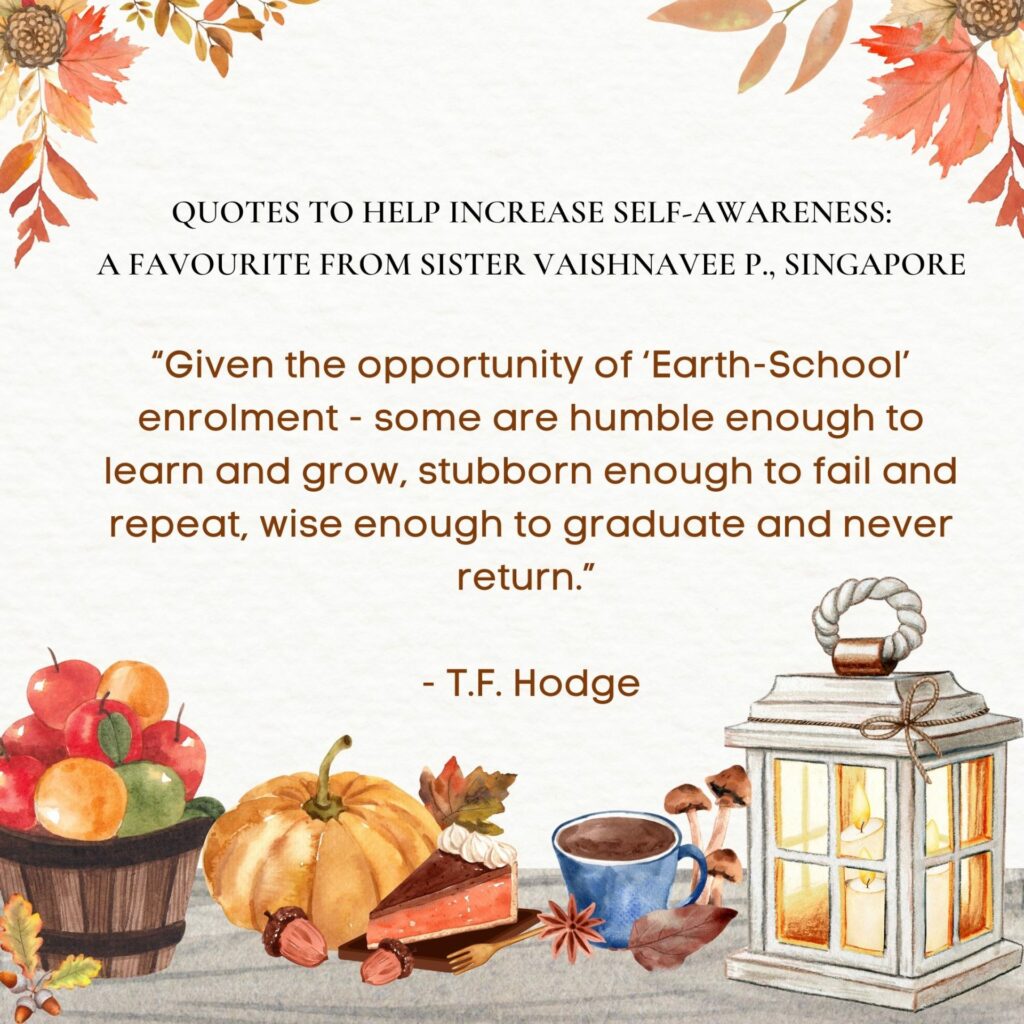
‘Earth-School’ is a term that is often used during our weekly discussions in the ‘Rise and Shine’ satsanghs which help me put everything that happens in my life in perspective. When I was younger I would have the habit of comparing incidents that happened in my life to those around me. Every time a hurdle or obstacle occurred it would religiously be followed with the most clichéd questions: “Why me? What wrong have I done?”. It was only in the teenage phase of my life that I came to understand that this planet which we are on is just a school that we are sent to, to learn to become one with God. Every incident and every encounter was strategically designed to help us get rid of the six enemies of our mind: kama (lust), krodha (anger), lobha (greed), mada (arrogance), moha (delusion), matsarya (jealousy). It was eye-opening when I had learnt that each one of us had chosen the lessons that we wanted to learn on Earth way before we assumed life in this specific human body. Each one of us had chosen our blueprint. Each one of us had chosen the script of the drama that we wanted to enact on this earth, so now it is time for action.
In multiple instances Swami has likened Life to a game. We truly are mere characters in a game, trying to level up in each round with the main goal of attaining moksha. Just as every game has a restart button, we too have a restart button to try again. However, unlike the games that we play which give us the memory of how we performed in the previous rounds, in this game of Life we come into Earth clueless, having to learn everything all over again, right from the beginning. The stories of those who have experienced Oneness seem so special and inviting that the thought of having to relearn how to walk, talk and eat with each body sounds so boring and tiresome. Hence, truly wise are those who have attained moksha and graduated from Earth-School without needing to return.
